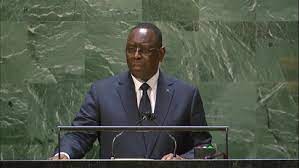President Macky Sall, the current chairman of the African Union (AU) has said it was time the world overcame its reluctance and deconstruct the narratives that persist in confining the black continent on the margins of global decision-making.
By Abdourahmane Diallo
“Nearly eighty years after the birth of the United Nations system and the Bretton Woods Institutions, it is time to establish a fairer, more inclusive global governance that is better adapted to the realities of our time,” said the Senegalese leader, who was speaking in his capacity as the current chair of the African Union at the 77th session of the United Nations General Assembly (UNGA) held at the organisation’s headquarters in New York.
Mr. Sall said that “it is time to give effect to Africa’s just and legitimate demand for reform of the Security Council, as reflected in the Ezulwini Consensus.”
The latter is a position on international relations and UN reform adopted by the African Union.
It calls for a more representative and democratic Security Council in which Africa, like all other regions of the world, is represented.
In the same spirit, President Macky Sall reiterated the AU’s request for a seat at the G20, “so that Africa can, at last, be represented where decisions are taken that affect one billion four hundred million Africans.”
Addressing the issue of climate urgency, he called on the international community to work towards the target of US$100 billion per year to support developing countries’ adaptation efforts and to finance the African Adaptation Acceleration Programme under the aegis of the African Development Bank (AfDB) and the Global Centre for Adaptation.
“We see adaptation funding not as aid, but as a contribution by industrialised countries to a global partnership of solidarity, in return for efforts by developing countries to avoid the polluting patterns that have plunged the planet into the current climate emergency,” he said.
The AU spokesperson also called for mobilisation in support of the International Atomic Energy Agency’s (IAEA) “Rays of Hope” campaign.
This campaign aims to strengthen the capacities of UN member countries and African countries in particular, in the fight against cancer, thanks to nuclear technologies such as medical imaging, nuclear medicine and radiotherapy.
Africa ready to work with everyone
For many years, the African continent was a battleground for foreign powers.
In the current global context marked by several crises, the risks of a return to this painful past are present.
“I have come to say that Africa has suffered enough of the burden of history; that it does not want to be the focus of a new cold war, but rather a pole of stability and opportunities open to all its partners, on a mutually beneficial basis,” Macky Sall said.
He thus made it known that beyond the current emergencies, he came to carry the message of a continent determined to work with all its partners, in a relational ethic of trusting dialogue and mutual respect.
If he is not unaware of the ”Africa of problems”, which must be pacified and stabilised, the Senegalese leader said he had also come to say that “we also have the Africa of solutions, with its 30 million km2, its human resources, more than 60 percent of the world’s arable land, its mineral, forestry, water and energy resources.”
“Yes, we have the Africa of solutions, with governments on the job; vibrant and creative youth who innovate, undertake and succeed; millions of men and women who work hard to feed, educate and care for their families; who invest, create wealth and generate jobs,” he said.
According to President Sall, this Africa of solutions wishes to engage with all its partners in reinvented relationships, which transcend the prejudice that who is not with me, is against me.
“We want a multilateralism that is open and respectful of our differences, because the United Nations system, born out of the ashes of war, can only win the support of all on the basis of shared ideals, and not local values erected as universal norms,” he said.
Macky Sall is convinced that “it is by working together while respecting our differences that we will restore the strength and vitality of the United Nations’ fundamental purpose: that is, to save present and future generations from the scourge of war, promote the peaceful coexistence of peoples and foster progress by establishing better living conditions for all.”
ARD/te/lb/as/APA


